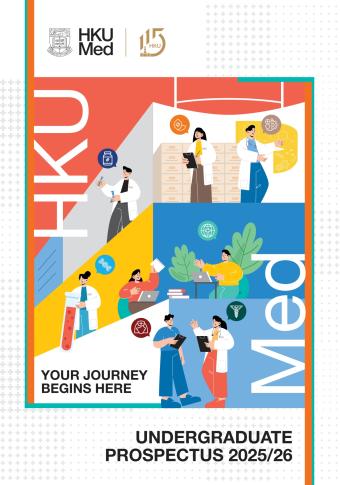Programme Introduction
Biomedical Sciences cover a wide range of scientific and allied disciplines. The study of biomedical sciences focuses on the inter-relationships between humans, health, and diseases, along with the translation of biomedical applications of basic sciences into the clinical practices of health services, and the healthcare industry.
The BBiomedSc curriculum is designed with a good balance of structure and flexibility, allowing students to plan their study straddling sciences and humanities. Students will be exposed to a wide range of learning experiences, varying with courses they are enrolled in. These experiences include traditional lectures, laboratory practicals, problem-based learning tutorials, web-based learning as well as research projects.
The Biomedical Sciences is designed to offer interest-driven learning, providing students with the opportunity to specialise in one of the following four Major areas of biomedical sciences according to their personal interests:
- Biomedical Research: explores a wide range of scientific and allied disciplines
- Bioinformatics: focuses on high-impact biomedical big data applications
- Clinical Sciences: builds strong foundation in clinical research and healthcare sciences
- Health Technology: covers development of innovative clinically-oriented biomedical technology
The Final Year Project and the Innovation Team Project are two options available as Capstone Experiences for students in their last year of study. The former allows students to integrate their knowledge and apply experimental and informatics skills to solve defined problems through research. The latter stimulates students to evaluate biomedical research output for translation into viable products to the intricacies of setting up a company.
Research and Summer Internship Opportunities
BBiomedSc students are provided with ample opportunities to experience laboratory-based research and be trained for a career in research and development.
Under the Summer Research Internship Programme, they can join the research teams of professoriate members of the Faculty, attach to the research laboratories of world-class universities abroad, and work in an external agency related to field of Biomedical Sciences or in other industries during summer.
The Undergraduate Research Fellowship Programme (URFP) of the University supports students in their pursuit of research and development with the provision of scholarships.
Biomedical Sciences graduates will be equipped with practical and transferable skills applicable to a wide range of areas in both public and private sectors.
Major employment areas include research in university and government laboratories; medical development and management for the pharmaceutical, diagnostics, medical devices industries; and hospital and healthcare planning. BBiomedSc students can participate in overseas exchange and/or articulation programmes in the third year of study for obtaining professional qualification after graduation.


